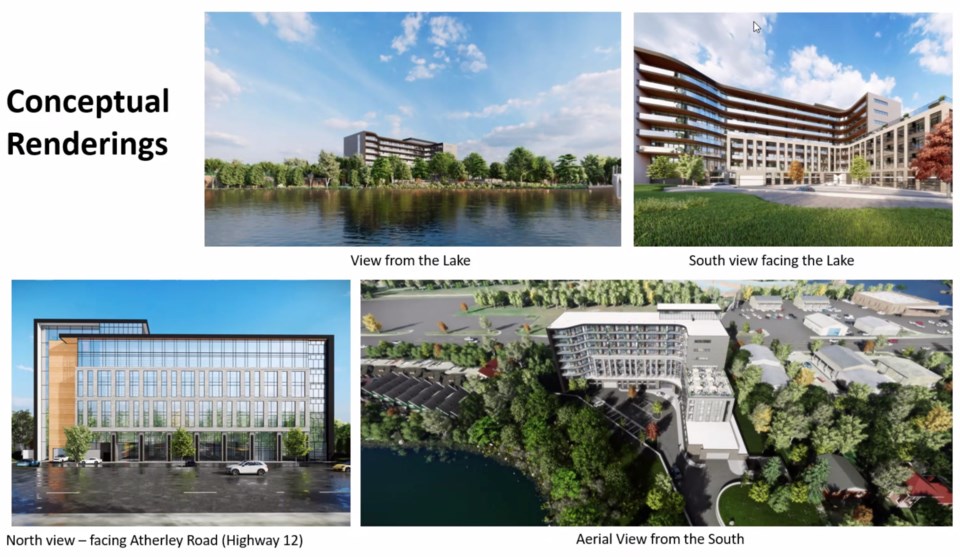OrilliaMatters welcomes letters to the editor at [email protected] or via the website. Please include your full name, daytime phone number and address (for verification of authorship, not publication).
Yesterday I observed an Ontario Land Tribunal (OLT) settlement hearing (OLT-24-00013) concerning an appeal by Coland Developments regarding their rezoning application to the City of Orillia.
Coland Developments had requested rezoning to allow for the development of an eight-storey condominium at 625 and 643 Atherley Rd. and 642 Driftwood Rd. (Orchard Point).
To describe the Aug. 6 event succinctly: it was a sham.
I found the entire rezoning process, which began with the developer’s application to the City of Orillia in 2021, to be extremely flawed. It was disturbing and disappointing to be involved with and to witness such an egregious imitation of democracy.
Let me give you some background.
In the City of Orillia, rezoning for the purpose of building an eight-storey building requires public consultation. For this rezoning application, the developer’s team (consultants) hosted two public open house meetings where they learned about concerns from the community — too numerous to mention here — but ranging from incompatibility with the neighbourhood, safety issues in an increasingly dense small neighbourhood and loss of natural heritage features along the shoreline of Lake Simcoe.
Over the past few years, in addition to the public open house meetings, residents had initiated and held meetings with the mayor, members of city council and city planners to voice their concerns. Phone calls had been made and letters written outlining opposition to the rezoning of the property for the eight-storey condo development. Numerous accounts of public opposition have been written and published in local media. A petition against the rezoning application contained hundreds of signatures.
While members of Orillia city council had reservations about approving such a development in an area (Orchard Point) that was already over-developed, they advised local residents to hire a planner to represent their position. Without a professional opinion, councillors would be hesitant to vote against the rezoning.
A community group was formed and we agreed to hire a planner, even though we were annoyed that we could not count on our municipal planning staff to make smart planning decisions on our behalf. In fact, from the outset, the municipal planning staff seemed to go out of their way to support and meet the needs of the developer.
Our independently hired planner worked with us to prepare a report, in which he concluded:
- The development proposal falls short of the prevailing (City of Orillia) Official Plan policy intent to protect the character of existing neighbourhoods;
- The proposed apartment building is out of character and incompatible with the low-density residential uses in the surrounding community; and
- The existing zoning designations on the subject property should be maintained as they allow for a balance of the intensification and community protection principles of the Official Plan.
The report was shared at a City of Orillia planning meeting on Dec. 14, 2023, where the final proposal from the developer was also presented for rezoning consideration and approval.
After hearing from the developer’s representatives (consultants), city planners, and dozens of Orillia residents — many of whom made deputations in opposition to the development — city council decided not to approve the rezoning application. Instead, a motion was made to defer the decision and ask the developer to respond with a lower-density proposal. The motion passed with only one vote not in favour. This was positive. City council had listened to their constituents and were in agreement with many of our concerns.
Soon after this meeting, the developer appealed city council’s motion, resulting in the decision on rezoning being referred to the province’s OLT.
The OLT set a date for a case management conference, which was attended by representatives of the city and the developer, along with community residents. To our surprise, the virtual meeting was cut short when it was announced that the city and Coland Developments had reached a settlement less than 48 hours before the scheduled meeting. As representatives of the neighbourhood, prepared to present our position, we were blindsided by this announcement. The city had, in the end, agreed to rezoning for an eight-storey condo development, likely in an effort to avoid the legal costs of defending its position at the OLT. I think it’s important to point out, however, that two councillors, Tim Lauer and Whitney Smith, did not vote in favour of this settlement.
As community representatives at this initial OLT meeting, we were advised that in order to participate in the forthcoming hearing, we would need to apply for ‘party’ status. Without this, we could only attend the meeting as observers. We were also warned that party status would not be granted unless we were prepared to have new evidence presented by a professional (lawyer or planner). The evidence we had, in the form of our planner’s report, had already been clearly stated and shared with the city and the OLT.
The follow-up OLT hearing took place on Aug. 6 without the participation of community members and without the city defending the concerns of residents.
The only presentation at the meeting came from WSP, the developer’s consulting firm. The WSP representative read a statement describing the proposal and reiterating language from municipal and provincial policies, such as how the development would contribute to “complete communities,” provide “affordable housing” (in luxury lakeside condos?), “remediate the shoreline” (only required due to development activity), and restrict traffic on Driftwood Road (at least until traffic lights are installed?). There were no follow-up questions or discussion. The rezoning application received approval.
I feel let down by our city council, city planners and the OLT. The entire process felt arbitrary and inequitable. It was an exercise in futility where, for the most part, individual rights and democracy were not valued.
Kathy Hunt
Orillia






